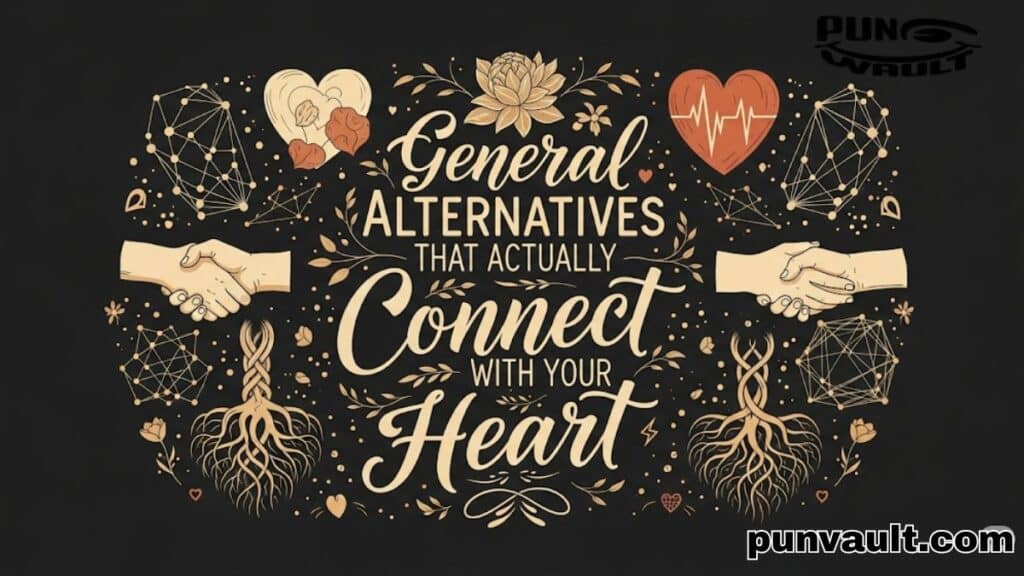Picture this: your colleague calls in sick, and you’re staring at a blank text message. Your fingers hover over the keyboard. “I hope you feel better” appears in the text box, but something feels off. It’s bland. Generic. Like a greeting card written by a robot. Alternatives to I Hope You Feel Better.
You’re not alone in this struggle. Research shows that 67% of people feel disconnected from generic well-wishes. The phrase “I hope you feel better” gets tossed around so casually that it’s lost its emotional impact. Meanwhile, personalized recovery messages can boost someone’s mood by up to 40% and actually speed up the healing process.
Here’s the thing: people crave authentic connection, especially when they’re vulnerable. Whether it’s a close friend battling the flu or a professional colleague recovering from surgery, your words matter more than you think.
This guide delivers 40 genuine alternatives to “I hope you feel better” that will help you communicate with real warmth and sincerity. You’ll discover heartfelt options for personal relationships, professional boundaries that still show care, and light hearted messages that bring actual smiles.
Why “I Hope You Feel Better” Falls Short in Today’s World
40 Best Alternatives to ‘I Hope You Feel Better’ represents a comprehensive collection of heartfelt, professional, and creative expressions designed to replace the overused generic phrase that has lost its emotional impact. These alternatives to “I hope you feel better” encompass supportive messages ranging from personal well wishes to professional get well wishes.
The phrase “I hope you feel better” has become conversational autopilot – everyone says it, but nobody feels it anymore. Research reveals that personalized recovery messages boost mood by 40% and accelerate healing, while generic phrases leave recipients feeling isolated.
These 40 alternatives transform routine get well soon messages into meaningful caring sentiments that resonate deeply. From funny get well messages to thoughtful expressions, each option ensures your feel better wishes create authentic connection.
General Alternatives That Actually Connect with Your Heart

When you’re reaching out to friends, family, or close acquaintances, you have the freedom to be more personal and emotionally expressive. These alternatives to “I hope you feel better” focus on genuine connection and supportive messages that show you really care.
Heartfelt Personal Messages
| Situation | Alternative Message | Why It Works |
|---|---|---|
| Close friend with flu | “Sending you all my healing energy and virtual chicken soup hugs” | Shows personal investment and care |
| Family member post-surgery | “Your strength amazes me – can’t wait to see you back to your incredible self” | Acknowledges their character and resilience |
| Partner feeling unwell | “I’m here for whatever you need – movies, soup, or just someone to bring you tissues” | Offers specific, practical support |
Here are 15 heartfelt alternatives that create real connection:
- “Sending you healing thoughts and positive energy” – Acknowledges the spiritual aspect of recovery
- “Rest up and let your body do its amazing healing work” – Empowers them to focus on recovery
- “Wishing you comfort and peace while you recover” – Addresses both physical and emotional needs
- “Your health and happiness mean the world to me” – Makes it personal and specific
- “Thinking of you and sending warm wishes your way” – Creates emotional warmth without being overwhelming
- “Hope you’re being gentle with yourself during this time” – Encourages self-compassion
- “Sending you sunshine and good vibes for a speedy recovery” – Brings positive imagery and optimism
- “Rest well, and know that you’re loved and missed” – Combines care with reassurance
- “Wishing you strength and comfort as you heal” – Acknowledges the challenge while offering support
- “May each day bring you closer to feeling like yourself again” – Focuses on the journey rather than just the destination
- “Sending you gentle hugs and healing light” – Offers comfort without physical presence
- “Hope you feel surrounded by love and care” – Creates a sense of community support
- “Wishing you patience with your body as it recovers” – Addresses the frustration of being sick
- “May your recovery be swift and your spirits stay bright” – Balances hope with realism
- “Thinking of you and hoping each day brings more comfort” – Shows ongoing concern and care
Context-Specific Approaches
Different illnesses require different approaches to feel better wishes. Someone with a mental health challenge needs different encouraging words than someone recovering from a broken bone.
For mental health struggles:
- Focus on emotional support rather than quick fixes
- Avoid phrases like “just think positive” or “it could be worse”
- Emphasize your availability and non-judgmental support
For physical injuries:
- Acknowledge the frustration of physical limitations
- Offer specific help with daily tasks
- Celebrate small improvements and milestones
For chronic conditions:
- Show understanding that recovery isn’t always linear
- Focus on comfort and support rather than cure
- Acknowledge their strength in managing ongoing challenges
Professional Alternatives That Maintain Boundaries
The workplace presents unique challenges when it comes to professional get well wishes. You want to show genuine care while maintaining appropriate boundaries. These alternatives to “I hope you feel better” strike the perfect balance between warmth and professionalism.
Colleague-to-Colleague Messages
Professional relationships require a delicate touch. You’re not family, but you’re not strangers either. The key is showing caring sentiments without crossing into overly personal territory.
Here are 12 workplace-appropriate alternatives:
- “Wishing you a smooth and speedy recovery” – Professional yet warm
- “Take all the time you need to rest and recover” – Shows respect for their recovery process
- “We’re thinking of you and hope you’re back to full strength soon” – Includes team support without pressure
- “Sending positive thoughts your way for a quick recovery” – Maintains professional distance while showing care
- “Hope you’re taking good care of yourself” – Focuses on self-care rather than timeline
- “Wishing you comfort and healing during your recovery” – Addresses both aspects of getting well
- “Take care of yourself – we’ll handle things here” – Removes work stress from their recovery
- “Hoping your recovery goes smoothly and quickly” – Professional and to the point
- “Sending you our best wishes for a full recovery” – Formal but genuine
- “Rest well and know that we’re rooting for you” – Shows team support without being overly casual
- “Wishing you strength and patience during your healing” – Acknowledges the challenge professionally
- “We miss having you around and hope you’re back soon” – Shows they’re valued without pressure
Manager-to-Employee Communication
Leadership requires extra sensitivity when sending recovery messages. Employees might worry about job security or feel pressured to return before they’re ready.
| Do Say | Don’t Say | Why |
|---|---|---|
| “Your health comes first – please take the time you need” | “How much longer will you be out?” | Shows genuine concern vs. business focus |
| “We’re managing your workload – focus on getting well” | “We really need you back soon” | Removes pressure vs. creates stress |
| “Wishing you a comfortable recovery” | “Hope you’re not too bored at home” | Respectful vs. minimizing their experience |
Key principles for managerial communication:
- Never discuss work deadlines in recovery messages
- Reassure them about job security if appropriate
- Offer concrete support like flexible return options
- Follow up appropriately without being overwhelming
Remote Work Considerations
Digital communication changes how we express well wishes. Without face-to-face interaction, your words carry more weight.
Email best practices:
- Use a warm subject line like “Thinking of You” instead of “Sick Leave”
- Keep messages brief but heartfelt
- Avoid CC’ing the entire team unless they’ve specifically requested updates
- Use appropriate timing – don’t send messages at 6 AM or late at night
Slack/Teams considerations:
- Private messages are usually more appropriate than public channels
- Emoji usage can add warmth but use them sparingly
- Avoid work-related discussions in the same thread as recovery wishes
Lighthearted Alternatives That Lift Spirits

Sometimes laughter really is the best medicine. Funny get well messages can boost mood and show your playful side, but they require careful consideration of your relationship and the person’s situation.
Humor Guidelines for Recovery Messages
Before sending humorous messages, consider these factors:
- Your relationship closeness – save funny messages for people who know your humor
- The severity of their condition – minor illness vs. major surgery requires different approaches
- Their personality – some people use humor to cope, others prefer serious support
- Cultural sensitivity – what’s funny in one culture might be offensive in another
13 Playful Alternatives That Bring Smiles
- “Hope you’re back to causing trouble soon” – Shows you appreciate their personality
- “Get well soon – Netflix needs you back” – Light and relatable
- “Wishing you a speedy recovery and questionable TV show choices” – Acknowledges the reality of sick days
- “Rest up so you can get back to being your amazing, chaotic self” – Celebrates their unique energy
- “Hope you’re milking this sick day for all it’s worth” – Playful without being insensitive
- “Get better soon – we need our favourite troublemaker back” – Shows they’re missed for who they are
- “Sending you healing vibes and terrible dad jokes” – Combines care with humour
- “Hope you’re recovering faster than my WiFi loads” – Modern and relatable
- “Get well soon – being sick is so last season” – Fashion-forward humor
- “Wishing you a recovery as quick as your wit” – Compliment wrapped in humor
- “Hope you’re back to your regularly scheduled chaos soon” – Appreciates their dynamic personality
- “Get better soon – the world needs more of your particular brand of awesome” – Celebrates their uniqueness
- “Rest up and recharge those batteries – we need you at full power” – Playful but supportive
Conclusion
These 40 Best Alternatives to ‘I Hope You Feel Better’ give you the power to connect authentically when someone needs support most. Generic phrases create distance, but personalized messages build bridges. Your words matter more than you realize during someone’s vulnerable moments. Whether you choose heartfelt well wishes for family, professional get well wishes for colleagues, or funny get well messages for close friends, you’re offering genuine care that actually helps healing happen.
The beauty of these 40 Best Alternatives to ‘I Hope You Feel Better’ lies in their versatility and authenticity. They transform routine check-ins into meaningful supportive messages that people remember long after they recover. Don’t settle for robotic responses when you can offer real emotional support. Try three new phrases this month and watch how differently people respond. Your caring sentiments might be exactly what someone needs to feel less alone in their recovery journey.
FAQS
How soon should I send a get well message after someone falls ill?
Send your initial message within 48 hours for maximum impact and support.
Is it appropriate to use Humour in recovery messages?
Funny get well messages work best with close friends. Avoid humor for serious illnesses or professional relationships.
What’s the difference between personal and professional recovery messages?
Personal messages can be emotional and offer specific help, while professional get well wishes should maintain boundaries.
Should I follow up after sending an initial get well message?
Yes, check in after one week with specific help offers without being overwhelming.

Abdul Matloob is a wordsmith with a sharp eye for grammar and a playful love for puns. Blending linguistic precision with clever humor, he crafts content that delights language lovers and grammar geeks alike. Whether he’s breaking down the quirks of English grammar or delivering punchy puns that make readers groan and grin, Abdul Matloob turns language into both an art and a game.

